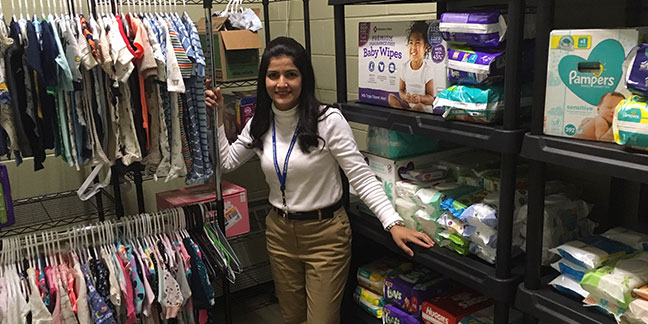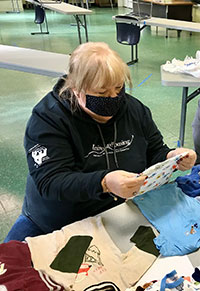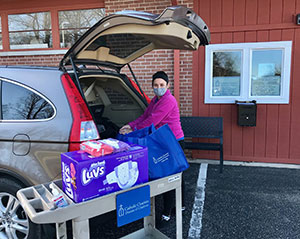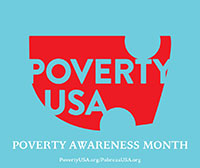 CHARLOTTE — This January, as the Church marks Poverty Awareness Month, the pandemic continues to take its toll on families across western North Carolina. Catholic Charities’ offices remain busy providing a variety of services including emergency food, baby supplies, rental assistance and help with utility bills, while also accompanying people in need during this difficult time.
CHARLOTTE — This January, as the Church marks Poverty Awareness Month, the pandemic continues to take its toll on families across western North Carolina. Catholic Charities’ offices remain busy providing a variety of services including emergency food, baby supplies, rental assistance and help with utility bills, while also accompanying people in need during this difficult time.
The number of North Carolina’s poor, already high before the pandemic at 13.6 percent – 1.4 million people, or about one in every seven North Carolinians – has increased due to income losses caused by the pandemic. According to the latest U.S. Census data: 17 percent of North Carolinians with children reported that their kids sometimes or often didn’t eat enough in the past week because they couldn’t afford it, 27 percent of adults living in rental housing reported being behind on rent, and 30 percent of all children live in a family that is either not getting enough to eat or behind on housing payments.
Catholic Charities’ staff and volunteers witness this reality of food and housing insecurity each day.
Over the past nine months, they have distributed 328,778 pounds of food, given out 158 bags of clothing to 153 families, and provided financial assistance in the way of rent to 245 households and utilities assistance to 195 households.
At the Western Regional Office in Asheville, staff and volunteers have been helping a disabled client who had been living in an old van and did not have a regular source of food. Her disability prevented her from being able to work, so Catholic Charities’ “Transition Out of Poverty” staff and volunteers began providing her with healthy food, evaluated her medical needs, provided her with warm clothing, and got her placed onto a priority waiting list for local subsidized housing. For months they remained in close contact with the client, encouraging her to keep doctor appointments and ensuring deliveries of food and other necessities. She was able to move into a new home the day before Thanksgiving, and Catholic Charities volunteers provided her with a celebratory “welcome home” Thanksgiving meal.
 Throughout her time in need, she said she felt welcome and heard when she visited the Catholic Charities office, and the emotional support she received kept her motivated to continue on her journey out of abject poverty.
Throughout her time in need, she said she felt welcome and heard when she visited the Catholic Charities office, and the emotional support she received kept her motivated to continue on her journey out of abject poverty.
In another example, staff and volunteers at Catholic Charities’ office in Winston-Salem have been assisting a single mother with three children who lost her car in an accident, then missed work as a certified nursing assistant when she was unable to find reliable and affordable transportation. Until she lost her car, she had been able to get to work, pay her bills, and take care of her family. But using other modes of transportation was financially costly and not always reliable, and her finances quickly spiraled downward: she fell behind on rent payments, and her landlord moved to have her evicted. She reached out to local social service agencies, but was unable to find help. Then she came to Catholic Charities.
Thanks to a generous donor who wanted their entire donation to be used to make a difference for one family, Catholic Charities was able to pay the entire amount of rent she owed, thus stopping the eviction process. She has since obtained a car and was able to remain in her home, signed a new lease and is now back on solid financial ground.
“The financial assistance she received from Catholic Charities prevented eviction that would have impacted her ability to secure other housing and potentially resulted in additional financial hardship for the family,” said Becky DuBois, Winston-Salem’s regional director.
In an effort to widen its reach and help more people, Catholic Charities is now participating in NCCARE360, the first statewide coordinated care network created to connect people in need with local services and resources. Catholic Charities’ Charlotte Region is currently getting an average of five referrals per day for help – usually rent and utility assistance for people who have fallen behind on their bills as a result of COVID-19 related income loss.
“We are deeply appreciative and sincerely humbled by the generosity of so many benefactors who have shared their time and talent as volunteers and financial resources as donors to support Catholic Charities in carrying out our ministry of charity, especially during the exceptionally trying times so many people find themselves in during the pandemic,” said Dr. Gerard Carter, executive director and CEO of Catholic Charities.
Help alleviate poverty right here at home
 Your financial donations can support Catholic Charities in its work to help people affected by the pandemic to buy food, pay their utility bills and avoid eviction. Make secure donations online at www.ccdoc.org (click on “Donate”); or by mail to: Catholic Charities, Central Processing, 1123 S. Church St., Charlotte, N.C. 28203.
Your financial donations can support Catholic Charities in its work to help people affected by the pandemic to buy food, pay their utility bills and avoid eviction. Make secure donations online at www.ccdoc.org (click on “Donate”); or by mail to: Catholic Charities, Central Processing, 1123 S. Church St., Charlotte, N.C. 28203.
Donations of food – particularly canned and dry goods, easy-to-prepare meals and kid-friendly snack items, personal hygiene items, toilet paper, soap and laundry detergent – are always welcome:
- ASHEVILLE: Drop off donations at the Western Regional Catholic Charities office (50 Orange St.) on Tuesdays, Wednesdays or Thursdays from 9 a.m. to 4 p.m. For questions or to make alternate arrangements at other times, call 828-255-0146.
- CHARLOTTE: Drop off donations at the Diocese of Charlotte Pastoral Center (1123 S. Church St.) from 9 a.m. to 3 p.m. Monday-Thursday. Contact Sylvia Sekle at 704-370-3295 or McKenzie Keane at 704-370-3261 to schedule a delivery at other times.
- WINSTON-SALEM: Drop off donations at the Winston-Salem Catholic Charities office (1612 E. 14th St.) on Mondays, Tuesdays, Wednesdays or Fridays from 9:30 a.m. to noon or 1:30 to 4 p.m. Questions? Contact Harley Elkins at 336-714-3203 or email This email address is being protected from spambots. You need JavaScript enabled to view it..
—SueAnn Howell, Senior reporter
Need help?
Catholic Charities intends to help as many people as possible during the pandemic. To find out about medical resources, changes to government benefits and food pantries near you, call 2-1-1 to find up-to-date information on available services. Families in the Charlotte area needing financial assistance can self-refer through NCCARE360 at www.nccare360.org/request-assistance.
Go online to learn more about poverty
 During Poverty Awareness Month, join the U.S. Bishops, the Catholic Campaign for Human Development, and the Catholic community in the United States in taking up Pope Francis’ challenge to live in solidarity with the poor.
During Poverty Awareness Month, join the U.S. Bishops, the Catholic Campaign for Human Development, and the Catholic community in the United States in taking up Pope Francis’ challenge to live in solidarity with the poor.
At www.povertyusa.org, check out a “Poverty USA Tour” video that presents the difficult struggles faced by families living at the poverty line, along with an interactive map of the U.S. that explores and compares the extent of poverty at the state and county levels. The website also includes daily reflections, prayers and information about addressing poverty and other economic justice issues.
Pictured: Volunteer Janie Anglely at Catholic Charities’ new Lenoir office sorts clothes for its “Wee Care Ministry”; curbside delivery of needed items; Gina Cabrera, Lenoir’s case management coordinator, reports helping about 50 families from Catawba, Caldwell, Burke and Alexander counties with diapers and other items during the pandemic. (Photos provided by Catholic Charities Diocese of Charlotte)


